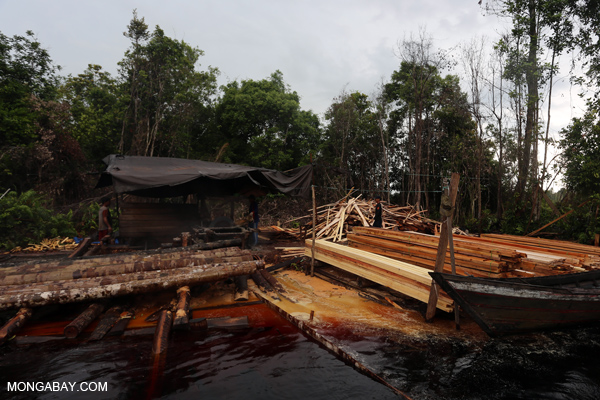A coalition of anti-corruption and environmental NGOs has urged Indonesia’s anti-graft body to investigate cases of corruption in the natural resources sector. Corruption linked to the forestry, mining and plantation industries leads to billions of dollars in state losses each year, the coalition said, with the country’s natural resources being used as a virtually bottomless piggy bank by corrupt officials.
“The embezzlement of regional budgets can be tackled, I’m sure of that,” said Tama S. Langkun, a researcher with Indonesia Corruption Watch, as quoted by the Jakarta Globe on June 17. “When the money runs out, the corruption ends. But with natural resources, it doesn’t end until the resources have run out, which is what makes it an essentially unlimited form of corruption.”
A group known as the Anti-Forestry Mafia Coalition, of which ICW is a member, earlier uncovered five case of alleged corruption representing more than 1.9 trillion rupiah ($192 million) in state losses over a six-month period. The group presented their findings to Indonesia’s Corruption Eradication Commission (KPK) on June 14 and urged the commission to investigate these cases and the endemic corruption in the natural resources sector.

Illegal swamill in Indonesian Borneo
“This is a serious problem, the KPK must quickly investigate,” said Tama on June 12, as quoted by Mongabay-Indonesia. “Alleged losses from the natural resources sector, such as mining, forests, and plantations, can reach the trillions. The impact from the destruction of the environment is also large.”
Based on investigations over a six-month period in 2012 and 2013 in South Sumatra, West Kalimantan and East Kalimantan, the coalition claims to have found evidence implicating 16 individuals including ministers, former ministers, and other local and national government officials, as well as the heads of several companies operating in the provinces.
In South Sumatra, allegations include corruption amounting to nearly 4.85 billion rupiah related to the operations of the state-owned plantation company PTPN VII’s Cinta Manis unit and 1.76 trillion rupiah in the awarding of a Forest Timber Product Utilization-Industrial Plantation Forest permit (IUPHHK-HTI) in the Merang-Kepayang peat swamp forest. In West Kalimantan, the group claims to have evidence of 51 billion rupiah in losses linked to timber product utilization and plantation forest permits and 109 billion rupiah in corruption linked to the re-zoning of protected forest areas in Kapuas Hulu district for palm oil plantations. In East Kalimantan, the group claims 4 billion rupiah was paid in bribes linked to the issuing of mining permits in Samarinda.
And these cases are likely just the tip of the iceberg. Wilmar Tumpak Hutabarat, a representative for the coalition, said there is evidence that corruption in the forestry sector reached over Rp 273 trillion in 2011, the Jakarta Globe reported.

Oil palm plantation in Indonesian Borneo
Investigasi Koalisi Temukan Dugaan Korupsi Kehutanan, Tambang dan Kebun Rp1,9 Triliun.
Related articles